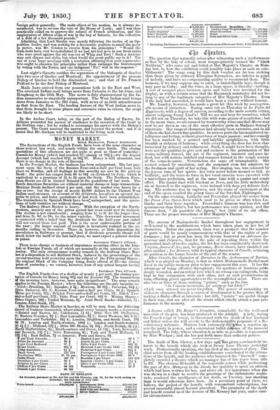Oratrts.
The question that naturally arises after witnessing such a performance as that by the lady of colour, most inappropriately termed the "black Malibran," who came out and failed at Her Majesty's Theatre on Mon- day last, is, how the exhibition could possibly take place at such an esta- blishment? The songs sung by this dark vocalist are far less striking than those given by ordinary Ethiopian Serenaders, are inferior in point of melody, and have no compensating quality to recommend them. The humour, if we may suppose any to exist, is unintelligible here, though it may pass in Cuba; and the voice, in a 'large space, is literally—nothing. A sort of mongrel piece between opera and ballet was invented for the display, as with a certain sense that the Havannah minstrelsy did not be- long to any of the legitimate categories of Her Majesty's Theatre. &OA if the lady had succeeded, it would have been a victory without honour. Mr. Lumley, however, has made a great hit this week by unexception- able means of attraction. Sontag came out on Thursday in La Pighn ski Reggimento, with a degree of success, according to the more ecstatic critics, almost eclipsing Jenny Lind's ! Till we see and hear for ourselves, which we did not on Thursday, we take this with some grains of scepticism ; but in the mean time, we are assured by trustworthy witnesses that Maria may now be set down as one of the most effective parts in Madame Sontag's repertoire. Her range of characters had already been extensive, and in all of them she had shown fine qualities. In serious parts she has manifested in- telligence and feeling, without great force of tragic passion ; and her comedy has been marked by a genteel and ladylike sprightliness, with little breadth or richness of humour ; while everything she does has been cha- racterized by delicacy and refinement. Such, it might have been thought, were not the qualities to give zest and raciness to the personation of the young military damsel, the pet of the regiment, innocent and pure in- deed, but with notions imbibed and manners formed in the rough society of the corps-de-garde. Nevertheless she came off triumphantly. She seemed roused by emulation, and she surprised even her admirers by the freshness and spirit of her acting. Her singing, too, was coloured by the joyous tone of her spirits: her voice never before seemed so full, so- brilliant ; and the tours de force in her vocal exercise were executed with a marvellous perfection, and at the same time with a quaint and comic effect. The tender duet with Gardoni as Tonio, and the little melancholy air of farewell to the regiment, were imbued with deep yet delicate feel- ing. The audience was in raptures, and the scene of excitement at the end of the opera recalled the palmy times of the Swedish Nightingale. On the same evening, Lablache and Frezzolini played the scenes from the Prove (run Opera Seria which used to be given so often when La- blache and Grisi were together. Frezzolini's humour was less rich and spontaneous than Griei's, but her performance was very spirited, and the famous duet, " Ah guardate cho figure," lost little of its old effect. These are the proper attractions of Her Majesty's Theatre.
The success of Mademoiselle Rachel throughout her engagement is well tested by the modifications which have taken place in her list of characters. Before she appeared, there was a prospect that the number of parts would be nearly commensurate with that of the nights of per- formance; but so great has been the favour bestowed on Adrienne Le- couvreur and Polyeucte, that for the sake of repeating these within the prescribed limit of twelve nights, the list has been considerably shortened. Virginie, Jeanne aw Arc, and, we presume, Marie Stuart, have vanished one after another ; Les Horaces, with its typical character of Camille, retaining its position as the bonne bouehe at the end of the season. After Camille, the character of Ifermione in the At:drone/we of Racine, which was played on Monday,. is that in which Mademoiselle Rachel most lived in the public memory prior to her engagement this year. It has the advantage of being effective throughout; the qualities of feminine pride deeply wounded, and an ardent love which no wrong can extinguish, being kept in fine antagonism with each other, and as each predominates in turn' affording grand opportunities to the accomplished artist. There ara also two or three of those striking "points," such as the line
" Je t'aimais inconstant, qu' aurais-je fait fidele ? "
which once uttered are never forgotten. The power of sustaining an elaborate character through a course of development is far greater than of making a flashy effect at intervals; • but still, "points" are useful things in their way, and are after all the rivets which chiefly attach a past per- formance to the memory.


























 Previous page
Previous page